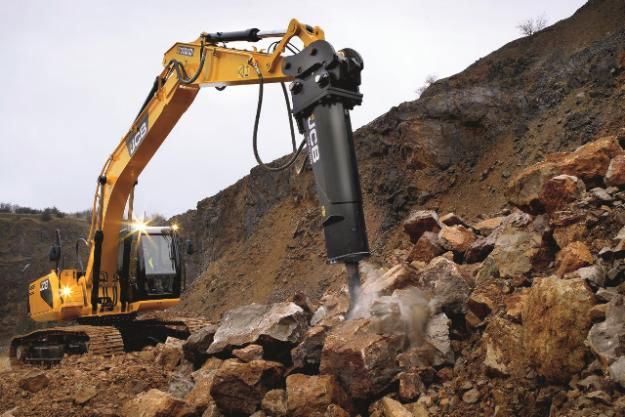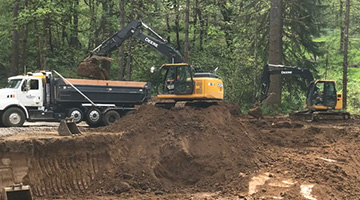Excavating Ohio - Top Excavation Professionals for Ohio Projects
Excavating Ohio - Top Excavation Professionals for Ohio Projects
Blog Article
Comprehensive Excavation Techniques: Grasping the Principles for Success
The careful preparation, specific implementation, and careful interest to detail called for in excavation jobs demand a detailed technique that includes various fundamental aspects. The real proficiency lies not merely in understanding these fundamentals yet in flawlessly incorporating them to browse the intricacies of excavation jobs with finesse.
Recognizing Excavation Task Preparation

The initial phase of any kind of excavation job is the planning stage, where important decisions are made that can dramatically impact the result of the task. Understanding the task scope, timeline, and budget plan restrictions is vital for producing a detailed excavation strategy that makes certain the job's success.
One trick element of excavation task preparation is the growth of a comprehensive timeline that lays out the series of target dates, activities, and landmarks. This timeline works as a roadmap for the task team, enabling them to track development and make required adjustments to ensure the task remains on routine. Furthermore, a distinct budget that accounts for all expenses, consisting of devices service, labor expenses, and materials, is necessary for preventing expense overruns and delays. By thoroughly considering all these factors throughout the preparation phase, excavation jobs can be executed successfully and properly, resulting in successful end results.
Dirt Evaluation and Site Examination
Conducting detailed soil analysis and website analysis is a vital action in the preparation phase of any type of excavation task. Dirt evaluation involves figuring out the make-up, structure, and residential or commercial properties of the dirt at the excavation website. This information is vital for recognizing the dirt's bearing ability, moisture content, and capacity for erosion, which are crucial consider establishing the excavation approaches and equipment needed for the project.
Site examination exceeds dirt evaluation and incorporates a broader assessment of the overall site conditions. This assessment includes identifying any kind of possible risks, such as underground utilities, ecological concerns, or unstable surface, that could influence the excavation procedure. By extensively reviewing the website, job supervisors can create efficient excavation methods that focus on safety, efficiency, and ecological defense.
Making use of innovative innovations like ground-penetrating radar, dirt tasting, and drone surveys can improve the accuracy and performance of dirt analysis and site assessment. Investing time and resources in these preliminary actions can ultimately save time and avoid costly delays or difficulties during the excavation process.
Devices Choice and Use
Reliable excavation tasks rely greatly on calculated equipment option and utilization to make certain ideal efficiency and efficiency. Choosing the ideal equipment for the work is crucial in taking full advantage of performance and reducing downtime. Elements such as the kind of dirt, depth of excavation, and task range play a significant function in identifying one of the most suitable tools for the task available.

Along with choosing the proper devices, appropriate use is key to task success. Operators must be trained to manage the devices safely and effectively - lancaster trenching. Normal upkeep checks and prompt repair work aid stop malfunctions and make sure constant performance throughout the project
Safety Measures and Rules Conformity
In the world of excavation jobs, focusing on security procedures and compliance with regulations is paramount to ensuring a lawfully sound and secure functional atmosphere. he said Safety and security actions incorporate a series of practices, including conducting comprehensive site assessments, implementing proper signage and obstacles, and giving ample security training for all personnel involved in the excavation process. Adherence to regulations, such as OSHA needs in the USA, ensures that the excavation task satisfies the necessary criteria to dump truck companies in ohio safeguard employees, spectators, and the surrounding atmosphere.

Monitoring Progression and Adjusting Approaches
How can predict managers successfully track the advancement of excavation jobs and adjust their techniques accordingly to enhance end results? Monitoring development is important for making sure that excavation tasks stay on track and satisfy target dates.

Final Thought
Finally, grasping the fundamentals of comprehensive additional info excavation approaches is crucial for the success of any type of job. By comprehending project preparation, assessing soil and site problems, choosing appropriate equipment, abiding with security regulations, and checking development, project supervisors can ensure a smooth and reliable excavation procedure. Implementing these strategies will certainly cause successful outcomes and lessen potential risks or troubles throughout the excavation job.
The first stage of any type of excavation job is the preparation phase, where essential decisions are made that can substantially influence the outcome of the job. Understanding the project extent, timeline, and budget constraints is important for creating an extensive excavation strategy that ensures the job's success.
Just how can project supervisors effectively track the advancement of excavation tasks and adapt their approaches appropriately to enhance end results? By very closely monitoring development and being eager to adjust strategies, project managers can enhance the overall success of excavation jobs.
By comprehending job preparation, examining dirt and site problems, selecting proper tools, complying with security guidelines, and monitoring progression, job supervisors can guarantee a smooth and reliable excavation process.
Report this page